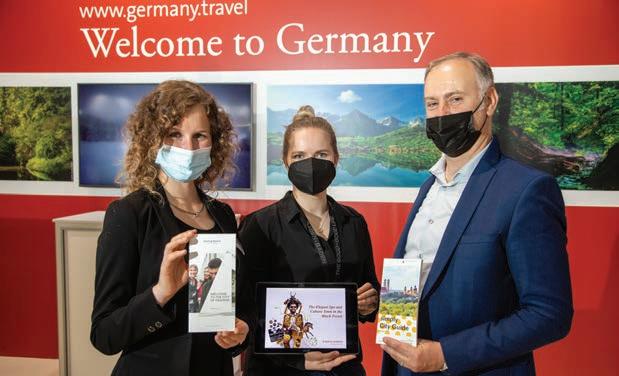
11 minute read
Aviation takes flight
As the world reopens its borders in a bid to rebuild tourism, airlines across the region are set for a resurgence while still grappling with the global economic slump
Few global industries have been hit as hard as the airline sector in the wake of the pandemic. The strict curbs on travel, which first emerged in March 2020, left fleets of planes grounded for weeks, causing air passenger traffic to plummet to unprecedented depths.
Advertisement
In a decade where the oil price slump and political instability left many carriers strapped for cash, the COVID-19 wave deepened the crisis, threatening the viability of many players within the industry.
As the virus continued its relentless march across the planet, aviation came to a standstill. Following widespread national lockdowns, from March to April 2020, international traffic fell by 98 percent from 2019 levels while domestic travel plummeted by 87 percent. Although the summer of 2020 reported a moderate rebound, the recovery was short-lived and confirmed what many travel experts long feared – a slow return to peak levels.
In January 2021, the International Civil Aviation Organisation (ICAO) revealed that seating capacity fell by around 50 percent in 2020, which saw just 1.8 billion passengers taking flights during the year, compared with around 4.5 billion in 2019. This resulted in staggering financial losses to the industry amounting to around US$370 billion.
Airports and air navigation service providers lost a further US$115 billion and US$13 billion, respectively. Overall, there was a 50 percent drop in domestic passenger traffic globally, while international traffic fell by 74 percent worldwide.
1 Spotlight on aviation 2 Wizz Air Abu Dhabi
Experts believe that these figures, when combined with the estimated losses from 2021, represent the two worst years for the industry, dwarfing the deficits recorded during the 2008 economic slump.
Although hit with equal severity, the region’s aviation sector has responded in a positive way with a series of fresh strategies and creative plans in motion to help them navigate through this turbulent time.
The approach now looks far more positive for 2021 and beyond as travel slowly begins to bounce back.
FLYING HIGH
The unprecedented events of 2020 resulted in Emirates, one of the world’s most successful airlines, posting a halfyear loss for the first time in 30 years. The Dubai-based carrier last reported a loss in the 1987-88 financial year, when it was just starting up operations.
As part of its pandemic containment measures, Emirates suspended scheduled passenger flights for eight weeks beginning in March 2020. This resulted in group revenue plummeting by 74 percent in the first six months of the financial year 2020-21 from April to September 2020 with a US$3.4 billion loss. Yet, as passenger traffic disappeared, Emirates was able to tap into other avenues of income to recoup losses.
“Emirates’ booking policies have also offered customers the flexibility and confidence to plan their travel with options to change their travel dates or extend their ticket validity for two years.”
As a result of these measures, Emirates has seen encouraging demand across its network with travellers now returning to the skies. The airline is optimistic that the demand for travel will return. “We are confident that we will emerge from the crisis well positioned to compete and grow, and we will continue to take positive steps to secure our long-term future.”
Meanwhile, at partner airline Flydubai, the pandemic shifted the carrier’s operations to supporting government requests with repatriation flights to more than 19 countries and enabling the movement of essential goods, such as perishables and medical supplies, across its network and beyond, explained Hamad Obaidalla, Chief Commercial Officer at Flydubai.
In the months leading up to the resumption of scheduled services, Obaidalla said: “Flydubai worked on redesigning its entire passenger journey and built upon the existing high standards of its operations to minimise the risk of transmission of COVID-19.
“Additional benefits that were made available to passengers included free global cover with every ticket booked and discounted rates for PCR tests.
A spokesperson for the airline said: “At such a testing time, we took swift action to serve cargo demand and other pockets of opportunity in addition to reducing our costs through rigid financial discipline. This helped us recover some of our revenues.”
With global tourism slowly finding its footing once more amid speedy vaccine rollouts, Emirates is poised to serve the rebound in travel.
“We’ve put huge efforts into making sure our customers are safe throughout their travels via thorough biosafety measures at every touchpoint of the journey. On the ground, we have implemented worldfirst innovations, such as the biometric path using facial and iris recognition at Dubai International Airport as well as contactless check-in kiosks, all providing a frictionless experience for passengers with virtually no interaction.”
A few months into the pandemic, Emirates became the first airline to introduce multi-risk travel insurance and COVID-19 cover on all tickets at no cost to customers.
In addition to COVID-19 medical cover, the package also has provisions for personal accidents during travel, winter sports incidents, loss of personal belongings and trip disruptions due to unexpected air space closures and government-issued travel recommendations or advisories.
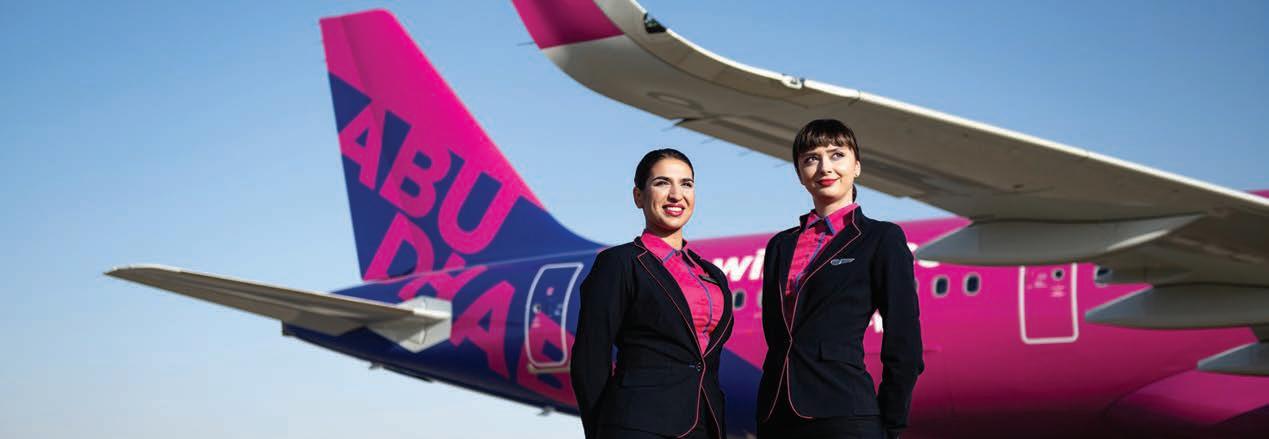
“As countries around our network began to lift travel restrictions, we were able to provide an opportunity to bring people together once again. We also looked for new opportunities to connect previously underserved markets to Dubai and we have recently announced the launch of flights to several new destinations as well as the resumption of flights to several popular destinations on our network, indicating that it is a good time to return to the skies.”
FORGING AHEAD
In Abu Dhabi, the UAE’s national carrier, Etihad Airways, was also pushed to a loss of US$1.7 billion in 2020 owing to lower demand and reduced flight capacity caused by the unparalleled global downturn in commercial aviation. Passenger revenue slumped by 74 percent to US$1.2 billion from US$4.8 billion in 2019 while passenger numbers dropped by 76 percent to 4.2 million, down from 17.5 million in 2019.
Despite the circumstances, Tony Douglas, Group Chief Executive Officer, Etihad Aviation Group, said that the airline perceived these challenges as an opportunity to turn things around, resulting in several accomplishments over the past year. “Our agile operation allowed us to react quickly to the changing market conditions and regulatory framework,” he explained.
With most of its fleet grounded at the start of the pandemic, Etihad Airways completed the most extensive aircraft maintenance programme in its history by surgically and clinically refreshing all 96 of its passenger aircraft and conducting minor maintenance tasks.
As passenger numbers decreased, Etihad Cargo, the airline’s freight operation, reported a surge in operations, driven by a huge demand for medical supplies and programmes to facilitate the distribution of COVID19 vaccines across the world.
With the resumption of passenger air travel, the carrier introduced the Etihad Wellness programme, which made Etihad Airways the first airline to necessitate COVID-19 testing before every flight. For the peace of mind of passengers and crew, every person on board tested negative before their flight, while those travelling also benefited from comprehensive COVID-19 cover with every ticket.
Earlier this year, the airline recorded another world-first by announcing that all of its pilots and crew on board were vaccinated against the virus.
With its sights set on a bright future, the airline is targeting a complete turnaround by 2023.
Douglas said: “I’m optimistic, thanks to the efforts of the UAE government coupled with the strength and resilience of our turnaround strategy, that global passenger demand will start to recover very quickly.”
At present, Etihad is working with a variety of different companies to trial a global health certification system that would help passengers easily and securely manage their travel in line with government requirements for COVID-19 tests or vaccines.
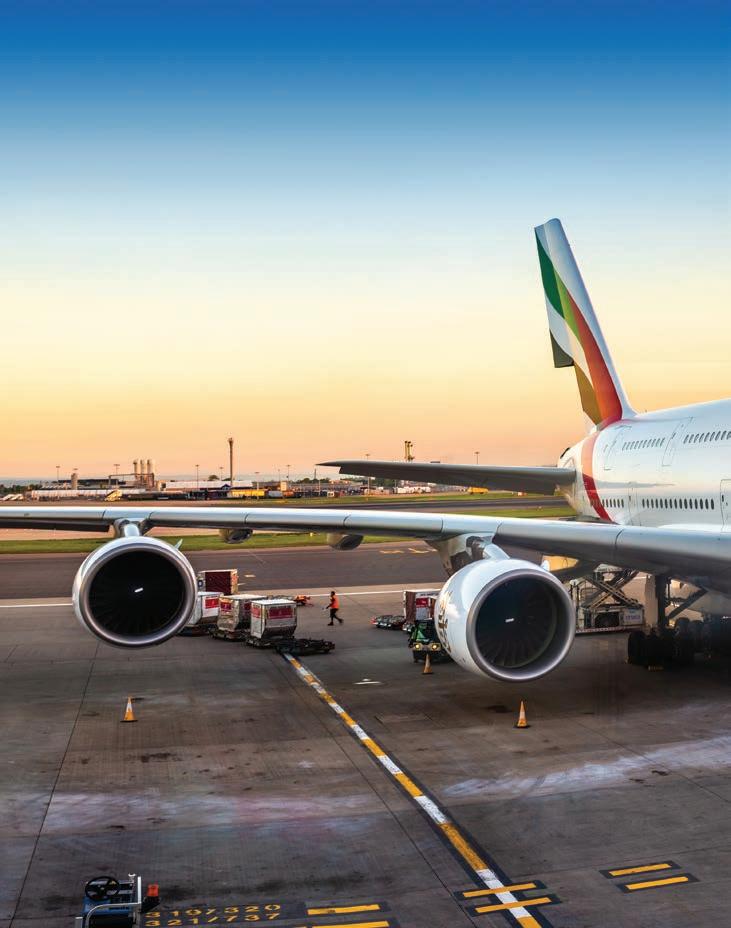
3
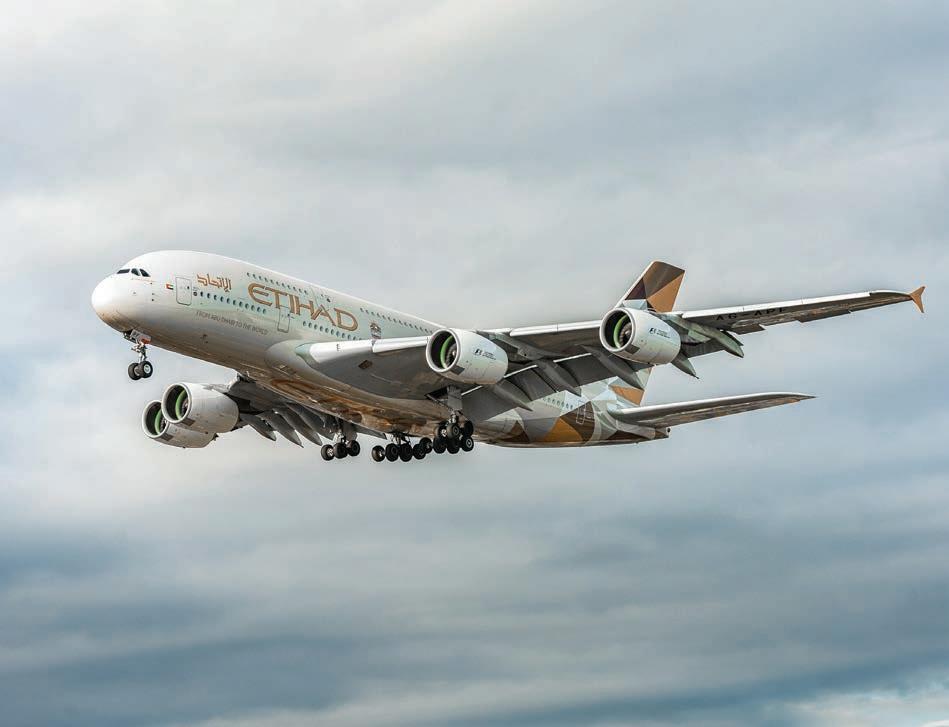
5

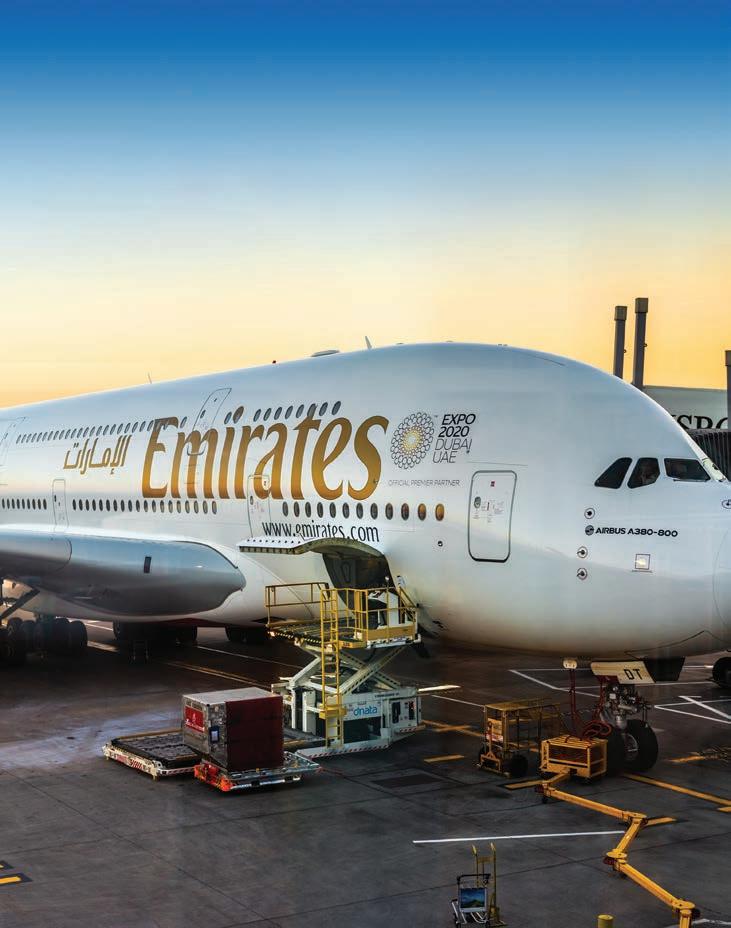
3 & 6 Emirates 4 Etihad Airways 5 John Strickland
A NEW PATH
With most aviation companies reporting incomparable losses, one airline made headlines for an entirely different reason – launching its operations in the midst of the pandemic.
When Wizz Air Abu Dhabi was first announced in December 2019, the air transport industry was yet to experience its worst-ever crisis. In spite of the situation that followed, the airline continued to remain hopeful as it promised to bring low-cost travel to Abu Dhabi, a feature which residents of the neighbouring emirate had long enjoyed since the launch of Flydubai in 2008.
As the coronavirus started to show its face in hotspots around the world and infections began rising dramatically, the airline’s planned Autumn 2020 launch was pushed back. Yet, despite increased travel restrictions, Wizz Air Abu Dhabi finally took to the skies in January 2021, launching with an inaugural route between the UAE capital and the Greek city of Athens.
Kees Van Schaick, Managing Director of Wizz Air Abu Dhabi, said: “While travel restrictions made the launch a bit more challenging by initially delaying it, we used this time to prepare to be bigger and better to open up new travel options to keep friends and families together. Later, when the green list of countries was introduced, we took the opportunity to launch. We are excited to be here on the ground – and in the skies – in the UAE.”
The decision to proceed with the planned launch was also driven by the UAE government’s handling of the crisis and vaccination efforts. Van Schaick believes that the GCC will be one of the first regions to recover from the crisis and that Wizz Air Abu Dhabi is well positioned to aid this industry-wide recovery.
“The current situation presents an important opportunity to think strategically and take a systematic approach to understand, evaluate and adapt to meet changing expectations in a way that encourages people to travel again. The pandemic has served as a catalyst for change, fostering greater innovation and regulatory change.”
Van Schaick also believes that the airline’s strength lies in its size. He explained: “We are a nimble and flexible organisation well equipped to navigate changes in policies to best serve travellers and their respective governments.
“As we emerge from a global recession, travellers are much more conscious of the money they are spending. The launch of Wizz Air Abu Dhabi recognises Abu Dhabi as a bold new frontier for ultra-low fare travel in the region. We firmly believe that as a ULCC, we are perfectly positioned to offer low fares to travellers.”
STRENGTHENING PARTNERSHIPS
While airlines in the region continue to fuel travel and tourism recovery, others are turning to the Middle East for new business opportunities.
Air Seychelles is one such airline, which took the opportunity to expand its operations, adding the UAE to its network of routes by announcing direct weekly flights from Dubai World Central Airport to the Seychelles.
As the first country to welcome inoculated travellers from around the world, the Seychelles is a safe holiday destination with strict measures in place to curb the spread of COVID-19.
The Indian Ocean archipelago reopened to international tourists earlier this year with 70 percent of its population vaccinated.
The CEO of Air Seychelles, Remco Althuis, said: “The Seychelles and the UAE are among the world leaders in vaccinating their populations and there are many similarities in the ease of access between the two countries, making them safe destinations for both residents and visitors.
“Dubai has also been a popular destination for Seychellois nationals. On evaluating the performance in the UAE market, the launch of the new seasonal flight route is one that makes complete business sense, particularly since Dubai is within the flying range of our A320neo aircraft.
“We are currently working with travel trade partners, DMCs and media agencies in Dubai to increase the visibility of Air Seychelles as well as the Seychelles as a destination. We also offer attractive fares and a convenient flight schedule carefully timed to allow one full week of vacation to travellers in the Seychelles.”

NAVIGATING THE PANDEMIC
John Strickland, a leading commentator on the airline sector for media worldwide, said: “Airlines are making great efforts to restore customer confidence in many ways, ranging from enormous efforts on hygiene and cleanliness to allowing maximum flexibility to change bookings, to accelerating the use of technology to make travel easier, seamless and less stressful.
“Flexibility is a high priority right now given all the uncertainties around travel. Price, too, remains a key factor in stimulating travel and, of course, provision of reliable and up-to-date information concerning all the testing and vaccination requirements.
“The industry has never before experienced a crisis on this scale and more than one year into the future is not remotely clear but there are learnings and there has already been significant adaptation.”



